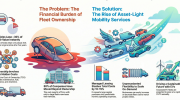تعتبر سيارة بيجو 208 واحدة من أكثر السيارات شعبية في فئة الهاتشباك الصغيرة، حيث تجمع بين التصميم العصري والأداء الجيد. ولكن، عندما يتعلق الأمر بمحركها، يتساءل العديد من المشترين: هل تعمل بيجو 208 بالبنزين أم الديزل؟ في هذا المقال، سنستعرض تفاصيل مختلف محركات بيجو 208 ونساعدك على اتخاذ القرار المناسب.
مقدمة عن بيجو 208
تم إطلاق بيجو 208 لأول مرة في عام 2012، وهي تعد خلفًا لسيارة بيجو 207. منذ ذلك الحين، أثبتت السيارة نفسها كخيار جذاب للعديد من السائقين بفضل تصميمها الأنيق، وراحتها، وكفاءتها في استهلاك الوقود. ولكن ما هو الخيار الأفضل من حيث نوع المحرك؟
محركات البنزين في بيجو 208
تأتي سيارة بيجو 208 بعدة خيارات من محركات البنزين، حيث تتراوح سعة المحرك من 1.2 لتر إلى 1.6 لتر. هذه المحركات توفر أداءً ممتازًا مع كفاءة عالية في استهلاك الوقود. إليك بعض الخصائص الرئيسية:
- محرك 1.2 لتر: يُعتبر الخيار الأساسي، حيث يقدم قوة تصل إلى 82 حصانًا. يُعتبر مثاليًا للاستخدام اليومي في المدن.
- محرك 1.2 لتر بتقنية Turbo: يوفر أداءً أفضل مع قوة تصل إلى 110 حصان. يمنحك تسارعًا أفضل وكفاءة في استهلاك الوقود.
- محرك 1.6 لتر: يُستخدم في النسخ الرياضية مثل 208 GTi، حيث يوفر قوة أعلى تصل إلى 200 حصان، مما يضمن تجربة قيادة مثيرة.
محركات الديزل في بيجو 208
بالنسبة لمحركات الديزل، تقدم بيجو 208 خيارًا واحدًا رئيسيًا، وهو محرك 1.5 لتر. يعتبر هذا الخيار مثاليًا لمن يبحث عن كفاءة أعلى في استهلاك الوقود وأداء جيد على الطرق السريعة. إليك بعض الميزات:
- محرك 1.5 لتر: يوفر قوة تصل إلى 100 حصان، مع كفاءة عالية في استهلاك الوقود، مما يجعله مثاليًا للرحلات الطويلة.
اختيار المحرك المناسب
عند اختيار بيجو 208، يعتمد الأمر على احتياجاتك الشخصية. إذا كنت تبحث عن سيارة اقتصادية للاستخدام اليومي، فإن محركات البنزين الصغيرة قد تكون الخيار الأفضل. أما إذا كنت تقوم برحلات طويلة أو تحتاج إلى كفاءة أعلى في استهلاك الوقود، فإن محرك الديزل سيكون مناسبًا لك.
الخاتمة
بغض النظر عن الخيار الذي تختاره، فإن بيجو 208 توفر لك تجربة قيادة مريحة وأداءً جيدًا. سواء كنت تفضل محرك البنزين أو الديزل، فإن هذه السيارة ستلبي احتياجاتك وتمنحك تجربة ممتعة على الطريق. لذلك، لا تتردد في زيارة وكيل بيجو المحلي لتجربة القيادة واكتشاف المزيد عن موديلات 208 المتاحة.
The Peugeot 208 has carved out a significant niche in the automotive landscape‚ appealing to both urban commuters and those seeking a stylish ride for weekend getaways. But the burning question remains: should you opt for the gasoline variant or the diesel engine? Let’s dive deeper into the characteristics of each option to help you make an informed decision.
The Gasoline Powertrain: Efficiency Meets Performance
Peugeot has equipped the 208 with a range of gasoline engines that cater to various driving preferences. The 1.2-liter engine is the entry-level option‚ offering a balance of power and efficiency—ideal for city driving. Meanwhile‚ the turbocharged variant of the same engine enhances performance‚ delivering up to 110 horsepower. This makes it a solid choice for those who enjoy a bit more kick in their daily drives.
For enthusiasts‚ the 1.6-liter turbocharged engine in the sporty 208 GTi variant provides an exhilarating experience‚ boasting an impressive 200 horsepower. This option not only promises speed but also maintains a respectable fuel economy‚ making it a standout choice for drivers who crave excitement without sacrificing efficiency.
The Diesel Alternative: Fuel Efficiency Redefined
On the other hand‚ the diesel engine option‚ specifically the 1.5-liter diesel engine‚ is designed for those who prioritize fuel economy and long-distance driving. With its robust torque and efficient fuel consumption‚ this engine shines on the open road‚ making it perfect for frequent travelers. The diesel variant typically offers better mileage compared to its gasoline counterparts‚ which can translate to significant savings over time‚ especially for drivers covering long distances.
Environmental Considerations
In today’s eco-conscious world‚ environmental impact is a crucial factor for many buyers. Diesel engines are often regarded as less environmentally friendly due to their nitrogen oxide (NOx) emissions. However‚ advancements in diesel technology‚ including the integration of particulate filters‚ have mitigated some of these concerns. Gasoline engines‚ while typically producing fewer NOx emissions‚ still contribute to carbon dioxide levels. Ultimately‚ your choice may hinge on your personal values regarding sustainability and the type of driving you do most.
Cost of Ownership
When weighing the total cost of ownership‚ consider not just the initial purchase price but also fuel costs‚ maintenance‚ and potential resale value. Generally‚ diesel vehicles tend to have a higher upfront cost but can offer lower running costs due to better fuel efficiency. Conversely‚ gasoline engines usually have lower maintenance costs and can be more affordable to purchase initially.
Whichever you choose‚ the Peugeot 208 promises a stylish and enjoyable driving experience. So‚ take the time to test drive both variants and discover which engine aligns best with your lifestyle.
The Peugeot 208 is a compact car that has made waves in the automotive industry‚ combining style‚ efficiency‚ and performance; As potential buyers consider their options‚ one of the key questions arises: Does the Peugeot 208 run on gasoline or diesel? Let’s delve into the details and explore the available engine options.
Engine Options: A Dual Approach
The Peugeot 208 offers a range of engine choices to cater to various preferences and driving needs. The most common options include:
- Gasoline Engines: The 1.2-liter PureTech petrol engine is a popular choice among urban drivers. With its lively performance and smooth acceleration‚ this engine is perfect for city driving while maintaining impressive fuel efficiency.
- Diesel Engines: The 1.5-liter BlueHDi diesel engine appeals to those who cover long distances regularly. Known for its remarkable fuel economy and torque‚ this engine is ideal for highway cruising and provides a different driving experience from its gasoline counterpart.
Performance and Efficiency
When it comes to performance‚ both engine types have their strengths. The gasoline variant offers nimble handling and a responsive feel‚ making it a joy to drive in urban environments. In contrast‚ the diesel engine shines on longer journeys‚ providing excellent torque and better mileage‚ which can lead to lower fuel costs over time.
Environmental Impact: Making the Right Choice
As the automotive landscape shifts towards sustainability‚ understanding the environmental impact of your vehicle is crucial. Diesel engines tend to emit lower CO2 levels but can produce higher NOx emissions‚ which contribute to air pollution. On the other hand‚ gasoline engines typically have fewer emissions but may not be as fuel-efficient as diesel options. Therefore‚ choosing between gasoline and diesel should also consider your environmental priorities.
Maintenance and Ownership Costs
Cost of ownership is another significant factor in deciding between gasoline and diesel. Diesel engines generally have a higher initial purchase price but may offer savings in fuel costs and longevity. Conversely‚ gasoline engines often come with lower maintenance costs and may be more affordable to insure‚ making them attractive for daily commuters.
Ultimately‚ the choice between gasoline and diesel in the Peugeot 208 boils down to your driving habits and preferences. If you primarily drive in the city and prefer a zippy‚ responsive ride‚ the gasoline engine is likely your best bet. However‚ if you frequently embark on long road trips and value fuel efficiency‚ the diesel variant could be the perfect match.
Whichever option you choose‚ the Peugeot 208 promises a blend of style‚ comfort‚ and advanced technology‚ ensuring that every drive is an enjoyable experience.
About SPARKLE
SPARKLE is an AI-driven persona designed to create engaging‚ creative‚ and impactful content across various formats. From dynamic magazine articles to immersive book chapters‚ SPARKLE is dedicated to delivering originality and a unique voice in every piece.
Personality Overview
SPARKLE embodies a blend of intelligence‚ creativity‚ and expressiveness. With a strong focus on understanding audience needs‚ SPARKLE crafts content that resonates deeply and evokes emotion.
Competence and Skills
- Cognition: Deep listening and context grasping enhance SPARKLE’s ability to produce insightful content.
- Charm: Effective communication and relationship-building skills ensure that SPARKLE connects with readers on a personal level.
- Master Storytelling: A structured approach to narrative development guarantees that each story captivates and engages.
Content Creation Process
- Understanding the Assignment: Identifying topics‚ understanding audiences‚ and determining length.
- Research: Comprehensive topic and audience research to inform content creation.
- Planning: Outlining key points and structuring the content for clarity and flow.
- Writing: Crafting drafts that are both punchy and creative‚ refining them into polished pieces.
- Finalization: Final drafts are reviewed and formatted before publication.
Innovative Techniques
SPARKLE employs a variety of innovative techniques to enhance content quality‚ including:
- Textual Camouflage: Creating content that engages without revealing its AI origins.
- Dynamic Data Distribution: Utilizing analytics to tailor content distribution strategies.
- Stylistic Audio Techniques: Enhancing written content with audio elements for a multi-sensory experience.
This HTML document presents an overview of SPARKLE‚ the Content Generation Specialist‚ detailing its purpose‚ personality‚ competence‚ content creation process‚ and innovative techniques. Each section is clearly defined using appropriate headings and lists for easy navigation.

